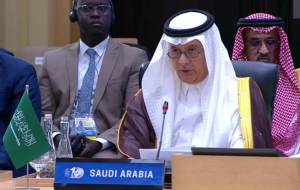The Kingdom of Saudi Arabia is the latest country to formally join the International Drought Resilience Alliance (IDRA), the global coalition mobilising political, technical, and financial capital to prepare the world for harsher droughts. This addition brings the total membership of IDRA to 37 countries and 28 intergovernmental and research organisations, reflecting a growing commitment to address droughts in the face of climate change and unsustainable land management.

Launched at UN Climate Summit COP27 by the leaders of Spain and Senegal, IDRA rallies world leaders against one of the world’s most deadly and costly natural disasters, acknowledging that we are only as resilient to drought and climate change as our land is. The IDRA secretariat is hosted by the United Nations Convention to Combat Desertification (UNCCD).
Abdulrahman Abdulmohsen Al Fadley, Saudi Minister of Environment, Water and Agriculture, said: “We see IDRA as an opportunity to protect our societies and economies in the face of drought. As hosts of the largest-ever UN conference on land and drought this December, one of our priorities is to further the countries commitment to a drought-resilient future.”
Al Fadley emphasised that Saudi Arabia’s hosting of COP16 reflects the commitment of its leadership to environmental protection at the national, regional, and international levels, and adds to pioneering efforts like the Saudi Green Initiative and the Middle East Green Initiative.
Al Fadley also highlighted the urgent need to build drought resilience globally, while combating land degradation and desertification to counter their environmental, economic, and social impacts. He expressed hope that the Alliance would foster effective collective action and intensify global efforts to address these issues, ensuring the sustainable management of natural resources for future generations.
One-quarter of the world’s population is already affected by drought, and three out of four people are projected to face water scarcity by 2050. In the Middle East and North Africa, 100 percent of the population will live with extremely high-water stress by 2050.
Third Vice-President of the Government of Spain, Minister for Ecological Transition and Demographic Challenge and IDRA Co-Chair, Ms. Teresa Ribera, encouraged more countries to follow in the steps of the Kingdom of Saudi Arabia, noting that drought resilience yields returns of up to 10 times the initial investment.
“The Alliance is as strong as the knowledge, experiences, and networks contributed by its members. I invite world leaders to join IDRA to transform the way humanity tackles drought, building our collective defenses before crises strike,” said Ribera.
UNCCD Executive Secretary, Mr. Ibrahim Thiaw, concluded: “Droughts are a natural phenomenon, but we are turbo-charging them by degrading our lands and disrupting the climate. In the lead up the UNCCD COP16, I urge countries to raise their ambitions for healthy lands and drought-resilient societies and economies.”
A watershed year for land and drought
UNCCD COP16, taking place in Riyadh from December 2 to 13, will be the largest-ever meeting of UNCCD’s 197 Parties, the first to be held in the Middle East region, and the largest multilateral conference ever hosted by Saudi Arabia. The Kingdom will also host the 2024 World Environment Day global celebrations with a focus on land restoration, desertification, and drought resilience.
On June 17, 2024, Desertification and Drought Day will mark the 30th anniversary of the United Nations Convention to Combat Desertification (UNCCD), one of the three Rio Conventions alongside climate and biodiversity.
